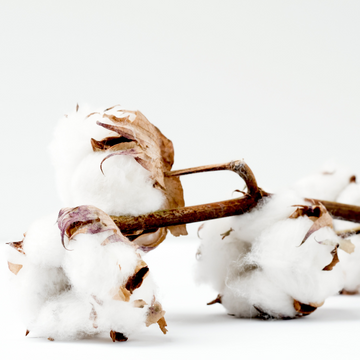Over the last decade, organic effects have become more famous among eco-conscious individuals. They have even made their way to the bedroom as well, such as cotton sheets and mattresses. Products of organic cotton material are slightly expensive to buy, which causes many shoppers to wonder what makes the contrast between organic and non-organic items.
As compared to regular cotton, organic cotton is more ethical and sustainable, defending the environment where it is cultivated whilst also delivering a stable income with fair wages for those who provide it. Organic cotton uses no chemical pesticides or fertiliser's, limits soil erosion and is slightly more greedy than regular cotton.
In this blog, we will look at the differences between regular and organic cotton. Later, we will discuss the benefits of purchasing commodities with organic cotton.
What do you understand about Organic Cotton?
Most people ask what organic fabric is and whose production has a common effect on the environment. Chemicals such as pesticides can devastate ecosystems and harm natural water sources. The process used to simulate organic cotton eases the use of poisonous substances.
Organic cotton is described as cotton that is produced without the use of pesticides, herbicides or chemical fertilizers. It is a sustainable and more environmentally friendly alternative to conventional cotton because it promotes healthier soils and diverse ecosystems, and by using natural processes, it is also safer for the people who grow it.
What Are The Environmental Benefits Of Organic Cotton:
The chemicals which are sprayed onto fields devastate local ecosystems, killing not only weeds but also wild plants and animals as well. Many synthetic pesticides accumulate in the food chain in toxic concentrations and can take years to break down. Chemical fertilizers also reduce soil quality over time, lowering crop output and ultimately accelerating soil erosion.
In comparison, organic cotton farming promotes biodiversity, encourages wildlife and helps support a diverse ecosystem. By working with rather than against nature, organic farming techniques also naturally improve soil quality which not only helps grow more vital, healthier crops but absorbs more CO2.
Does Organic Cotton Feel Different?
Did you know that cotton is used as a significant standard fibre on the planet? This fluffy plant which is white in colour is used in most textiles all over the globe. This is also because of its strength and malleability, and it is no wonder cotton is such a famous fibre.
But just because it isn't synthetic doesn't mean cotton is all sunshine and daisies; as with most materials and products produced on a mass scale, cotton also carries with it a dark history and presents a shocking reality - which organic cotton, amongst some excellent alternatives are trying to remedy.
Organic cotton is gathered almost entirely by hand. This preserves the purity of each fibre and ensures that nothing is damaged in the procedure. On the other hand, conventional cotton is gathered by machines in order to meet its high demand and save time. Traditional cotton is feeble, but organic cotton can be even more delicate. This makes attire less durable and less soft than its eco-friendly companions.
Difference between organic and regular cotton

There is an earth of distinction between organic and regular cotton. The miracles of organic cotton that does not stop at the quality of products. Anyone who has used organic cotton yields will find it difficult to return to standard cotton. Read on to find out a large number of differences between both of them:
Purity of the Cotton
The purity of cotton vs organic cotton is judged by how the cotton is picked. Cotton is either hand-picked or machine-picked. Regular cotton is more in supply and demand, which is usually machine-picked to cope up with the squirt. This doesn't preserve the fibres' innocence and destroys the cotton fibres for the picking process, showing wastage and loss. Organic cotton is wholly favoured, maintaining the purity of every fibre and confirming that no thread is injured in operation. Organic cotton creations are softer than regular cotton because of the more elongated fibres. Being handpicked ensures these fibres don't get broken or weakened, resulting in more light and more long-lasting products.
Cotton Farming
Regular cotton farming begins with genetically modified seeds and GMOs. Organic cotton is made from natural sources, and pesticides or other harmful chemicals are not used. Bugs are controlled with insects that will destroy all types of pests. They are limited to building resistance to bugs, but more pesticides are required when the bugs become more powerful. As a result, items of cotton are much safer for the skin.
Regular cotton is grown over the same soil over and over, degrading the quality of the soil, leading to unhealthy crops, and removing nutrients. Since these crops demand more and more water, they are irrigated heavily, resulting in more wastage of water. Organic cotton is turned from one soil to another, and the nutrients maintain water for a long time, demanding less irrigation. This leads to more nutritious crops.
Weeding
The weeding process of regular cotton agriculture also uses chemicals in the form of insecticides that kill weeds. These contain highly toxic carcinogens and insecticides. Such harmful substances affect the rate of crops and suck out dampness and soil nutrients, which may also damage the farmer. Out of the total amount of insecticide used in agriculture, more than 30% is used for cotton. Regular usage of such chemicals can lead to painful diseases in agriculturalists and impact the adjacent environment. Weeding is done by hoeing, hand, and different cultivation methods in organic cotton manufacturing.
Manufacturing
Processing of regular cotton uses a large number of chemicals. The use of heavy metals, chlorine, and chemical dyes is not unheard of in the manufacturing of regular cotton. Even after passing the finished effects, the remains of these chemicals stay, which may cause severe allergies to the skin. Many people suffer from skin issues like eczema because of its non-stop products. Organic cotton uses safer alternatives to chemical whiteners and dyes. Natural or water-based stains, peroxide for whitening, and other safer effects are used to manufacture the final goods.
Organic cotton is eco-friendly and a sustainable option to standard cotton as it is more hypoallergenic and lasts for an extended period. But the most crucial advantage is covering the ecosystem, decreasing water wastage, and providing safer working conditions for the farmers and manufacturers.
The Final Thought On the Difference Between Organic And Real Cotton:
Regular cotton is a more reasonable option, but it can harshly affect the backdrop. When you buy organic cotton, you always ask yourself if organic cotton is better for making your environment better. The answer is yes; organic cotton is produced without any chemical insecticides, making it safer for slumberers. Plus, organic cotton is plush and has genuine moisture-wicking capabilities. This way, you can stay cozy without stressing about overheating.
Also read some interesting information about CONVERTIBLE PURSE BACKPACK FOR THOSE WHO LOVE TO CHANGE







